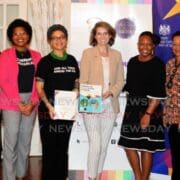Caiso offers workshop series for policy implementation
Black Immigrant Daily News
From left: Content & social media consultant Maiah Cooper, community outreach associate Johannah-Rae Reyes, Caiso director Dr Angelique Nixon, British High Commissioner Harriet Cross; community lawyer Donielle Jones, Caiso director Catherine Shepherd and research associate Kellog Nkemakolam at the launch of Caiso’s Implementing the Way Forward series on July 19 at the Residence of the British High Commissioner. – ROGER JACOB
Private sector and civil society organisations willing to adopt the model workplace LGBTQI+ (lesbian, gay, bisexual, transgender, queer, and intersex) policy developed by Caiso: Sex and Gender Justice can now receive training in its implementation. The NGO has launched a workshop series and educational materials for organisations called Implementing a Way Forward.
Speaking at the launch of the series on July 19 at the residence of the British High Commissioner, Caiso director Angelique Nixon said the model policy and project were an outgrowth of Caiso’s Wholeness and Justice programme, which provided legal, psychosocial, and wholeness development services to members of the LGBTQI+ community.
Nixon said the workplace policy provides guidelines, small and large steps for employees and employers to take. She said the objectives are to eliminate prejudicial treatment, put forward steps for redress, and create awareness and appreciation of workplace diversity.
Some of the issues addressed in the policy include discriminatory harassment, privacy, workplace benefits, employee assistance programme, and a complaints procedure, among others.
The launch celebrated 19 participants from local private sector and civil society organisations, who attended the first round of workshops and outreach efforts.
CAISO research associate Kellog Nkemakolam said the workshop materials, which include videos, case studies, reflections, case studies, and worksheets, were framed in conversational, easy to understand ways which made it easy for people to explore and engage with the concepts presented. A toolkit and video series supports participants and organisations beyond workshop sessions. He said each section was targeted toward employers, LGBTQI+ employees, and non- LGBTQI+ employees.
As an example, the first question asked, what does discrimination look like? The document would inform the employer of their social and statutory obligations to their employees, and give the non- LGBTQI+ employees tools to reflect on the challenges faced by their co lleagues, think about how they might be excluding them, and how they can be allies.
Caiso community outreach associate Johannah-Rae Reyes said three workshop series had been carried out so far. She said Caiso offered three packages to companies which were willing to adopt the policy: a basic implementation package, an intermediate package, and an A-Z custom implementation package.
“The goals of the interactive workshops include getting informed workers talking and thinking about gender and sexuality in the context of the workplace, in healthy ways and oriented towards respect and safety for all; and introducing management to practical tools for policy implementation in order to create an enabling working environment for all. Both of these are ultimately geared towards ensuring that LGBTQI+ persons in TT find an equal place at work.”
Speaking at the launch, British High commissioner Harriet Cross said she was pleased that the embassy was able to provide funding for the launch of the policy.
“Every person should have a fair opportunity in life, no matter who they are or where they come from. The LGBT+ community is not asking for special rights, but for the same rights as everyone else. We must all work to eliminate discrimination in the workplace and ensure fair treatment for all. There is evidence that countries which are more inclusive are wealthier and businesses that take diversity in their workforces seriously are more successful. The UK is proud to support LGBT+ equality by funding this important policy and workshop series.”
NewsAmericasNow.com










